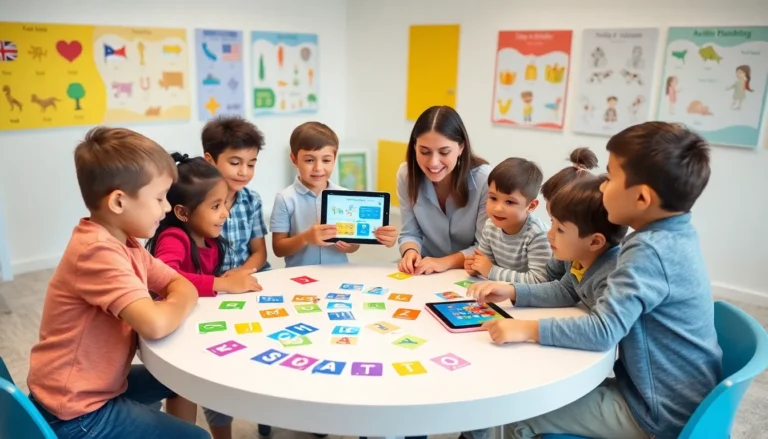Table of Contents
ToggleImagine this: you’re sitting in a café, sipping on an artfully crafted espresso, engaging in conversation effortlessly in a language that used to feel like an insurmountable puzzle. Learning a new language does more than just impress the barista: it can actually work wonders for your brain. Not only can it add a splash of intrigue to your social life, but it also offers a myriad of cognitive benefits that might just leave you feeling more lively and sharp. Ready to jump into how picking up a new language might boost those brain cells? Let’s go.
Cognitive Benefits Of Learning A New Language

Enhanced Memory And Recall
Learning a new language can greatly enhance memory and recall abilities. When someone engages in the complexities of another language, they are constantly pushing their brains to recognize, memorize, and eventually use new vocabulary while following unique grammatical structures. This exercise is akin to a workout for the brain. Consider the significant mental effort required to switch between languages. It’s this very effort that sharpens overall memory functions, improving one’s ability to remember not just languages but other aspects of life as well.
Improved Problem-Solving Skills
Speaking multiple languages often leads to improved problem-solving skills. Language learning challenges the brain to think critically and creatively. It requires learners to negotiate meaning based on context, which translates into sharper analytical abilities across different areas. For instance, whether tackling a math problem or navigating a tricky situation at work, bilingual individuals have been noted to approach problems with innovative perspectives: they simply see things differently.
Increased Attention Span
Let’s face it: our modern world comes with ample distractions. But, learning a new language trains individuals to focus and concentrate. Navigating the melody of a foreign tongue, recognizing cadence and rhythm, and understanding nuance all require heightened attention. This focused practice not only translates to better language skills but also enhances concentration in everyday tasks. So yes, language learning can make someone sharper in a busy world full of shining distractions.
Neuroplasticity And Language Acquisition
Understanding Neuroplasticity
Neuroplasticity is the brain’s ability to reorganize itself by forming new neural connections throughout life. This remarkable trait means that our brains can adapt as we learn new skills, including languages. Each time someone learns an additional language, they are using and strengthening their brain’s neuroplastic capabilities. Think of it as expanding a city: with new roads (or connections) built, the city can function more efficiently.
How Language Learning Promotes Neuroplasticity
When engaging in language acquisition, numerous areas of the brain are stimulated, especially the areas associated with language processing. Research shows that the act of learning a new language can lead to actual structural changes in the brain. Not only do new connections form, but the overall efficiency of communication between different areas improves, enhancing cognitive function overall. Language learners may find that, just as one language expands their understanding, this process opens up new pathways of thought and flexibility in thinking.
Long-Term Brain Health And Language Learning
Connection To Delayed Cognitive Decline
Delving into the realms of different languages can serve as a powerful tool against cognitive decline. Several studies have demonstrated that bilingualism can delay the onset of cognitive decline due to aging. The mental workout that comes from continual language practice fortifies the brain against age-related deterioration. When compared to monolingual individuals, those who speak multiple languages often exhibited signs of mental agility that translated into longevity in mental health.
Impact On Dementia And Alzheimer’s Disease
Also, learning a new language has been linked to reduced risks of developing dementia and Alzheimer’s disease. The complexities involved in organizing words and thoughts in varying languages contribute to cognitive reserve. This reserve helps individuals maintain cognitive health. Studies suggest that engaging with multiple languages not only strengthens brain functioning but acts as a preventive shield, so facilitating better overall brain health well into one’s golden years.
Practical Tips For Language Learning
Setting Realistic Goals
When embarking on the journey of language learning, setting realistic goals can be a game changer. Instead of trying to master a language overnight, one can feasibly break the learning process into achievable milestones. Perhaps aim to learn ten new words a week or join a conversational group. This not only maintains motivation but also allows for consistent progress.
Utilizing Technology And Resources
In this digital age, technology is a language learner’s best friend. From apps designed for specific language skills to online conversation platforms, the resources available today are staggering. Language exchanges, podcasts, and interactive courses can transform mundane learning into a fun and engaging experience. All it takes is a little exploration to find what works best for each individual.
Social Aspects Of Language Learning
Building Cultural Connections
Learning a new language isn’t just a brain workout: it also opens doors to rich cultural connections. Engaging with different languages enables individuals to understand varied cultural contexts and experiences. This depth allows for authentic interactions with speakers of that language, transforming simple words into a bridge connecting diverse backgrounds and histories.
Enhancing Social Skills Through Communication
As individuals strengthen their language capabilities, they often notice improvements in their overall communication skills. Navigating new languages gives one a fresh perspective on expressing ideas, emotions, and stories. Such growth fosters confidence in social settings, enriching personal and professional relationships alike. Eventually, learning a language is not just about words: it’s about creating connections that transcend borders.






